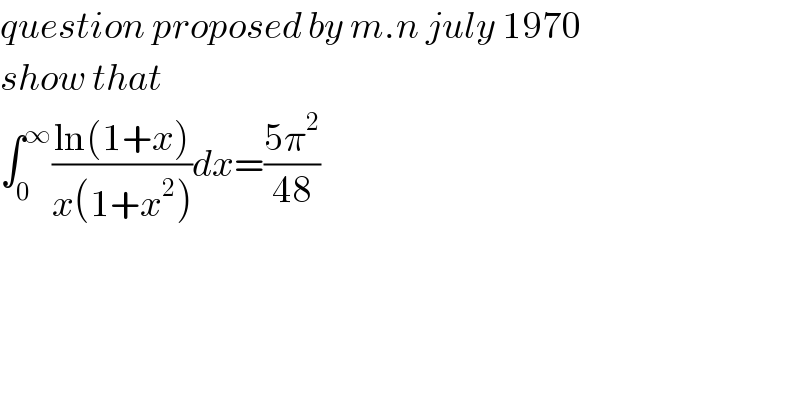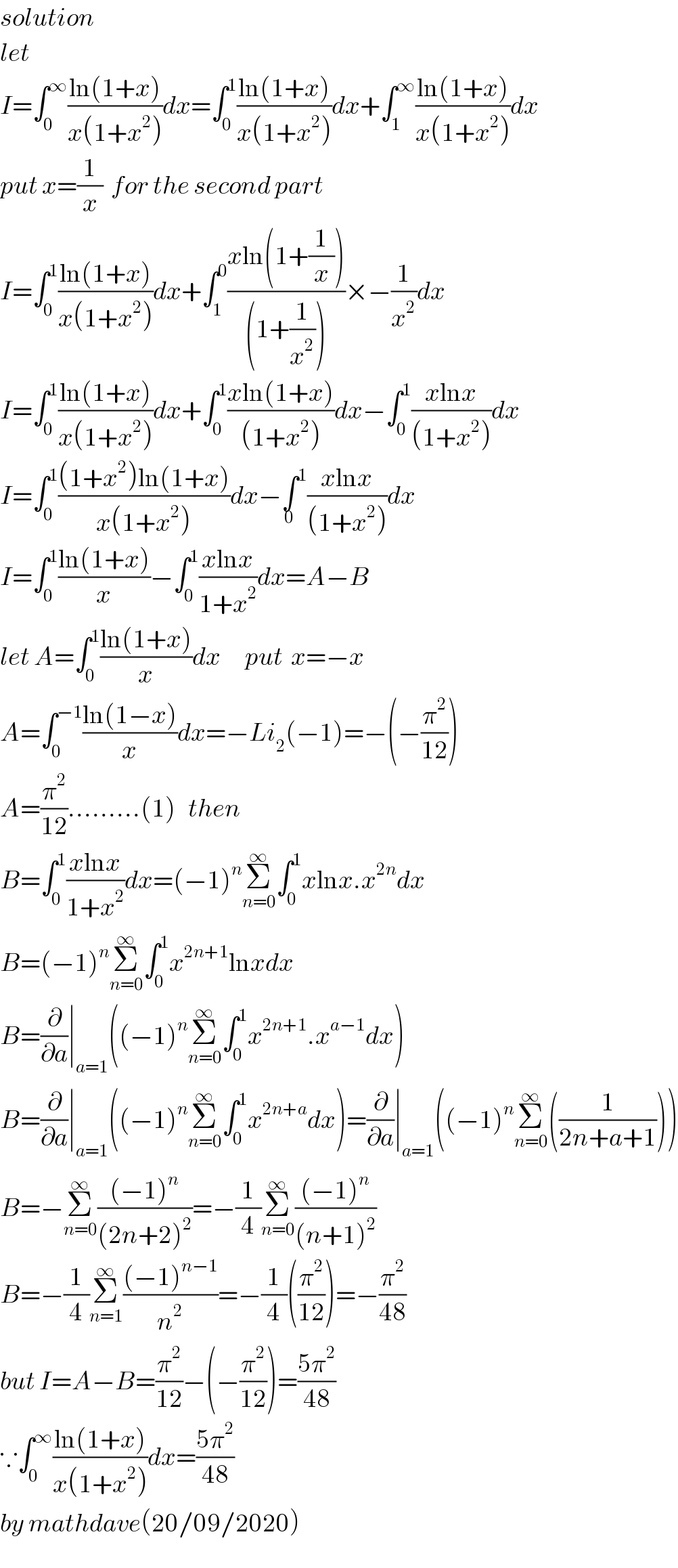
Question and Answers Forum
Question Number 114740 by mathdave last updated on 20/Sep/20

Answered by mathdave last updated on 20/Sep/20

Commented by mnjuly1970 last updated on 21/Sep/20

Commented by Ar Brandon last updated on 21/Sep/20
welldone ��
Commented by Tawa11 last updated on 06/Sep/21

Answered by mathmax by abdo last updated on 20/Sep/20
![I =∫_0 ^∞ ((ln(1+x))/(x(1+x^2 )))dx ⇒I =∫_0 ^1 ((ln(1+x))/(x(1+x^2 )))dx +∫_1 ^(+∞) ((ln(1+x))/(x(1+x^2 )))dx(→x=(1/t)) =∫_0 ^1 ((ln(1+x))/(x(1+x^2 )))dx +∫_0 ^1 t((ln(1+(1/t)))/((1+(1/t^2 ))))((dt/t^2 )) =∫_0 ^1 ((ln(1+x))/(x(1+x^2 )))dx +∫_0 ^1 ((x×(ln(1+x)−lnx))/(1+x^2 )) dt =∫_0 ^1 ((ln(1+x))/(x(1+x^2 )))dx +∫_0 ^1 ((x^2 ln(1+x))/(x(1+x^2 )))dx−∫_0 ^1 ((xln(x))/(1+x^2 ))dx =∫_0 ^1 ((ln(1+x))/x)dx−∫_0 ^1 ((xln(x))/(1+x^2 ))dx we have (d/dx)ln(1+x) =(1/(1+x)) =Σ_(n=0) ^∞ (−1)^n x^n ⇒ln(1+x)=Σ_(n=0) ^∞ (((−1)^n x^(n+1) )/(n+1)) =Σ_(n=1) ^∞ (((−1)^(n−1) x^n )/n)⇒((ln(1+x))/x) =Σ_(n=1) ^∞ (((−1)^(n−1) )/n)x^(n−1) ⇒ ∫_0 ^1 ((ln(1+x))/x)dx =Σ_(n=1) ^∞ (((−1)^(n−1) )/n^2 ) =−Σ_(n=1) ^∞ (((−1)^n )/n^2 ) =−{2^(1−2) −1}ξ(2) =(π^2 /(12)) also we have ∫_0 ^1 ((xln(x))/(1+x^2 ))dx =∫_0 ^1 xlnxΣ_(n=0) ^∞ (−1)^n x^(2n) dx =Σ_(n=0) ^∞ (−1)^n ∫_0 ^1 x^(2n+1) ln(x)dx =Σ_(n=0) ^∞ (−1)^n u_n by parts u_n =[(x^(2n+2) /(2n+2))ln(x)]_0 ^1 −∫_0 ^1 (x^(2n+2) /(2n+2))(dx/x) =−(1/((2n+2)^2 )) ⇒ ∫_0 ^1 ((xlnx)/(1+x^2 ))dx =−Σ_(n=0) ^∞ (((−1)^n )/(4(n+1)^2 )) =−(1/4)Σ_(n=1) ^∞ (((−1)^(n−1) )/n^2 ) =(1/4)Σ_(n=1) ^∞ (((−1)^n )/n^2 ) =(1/4)(−(π^2 /(12))) =−(π^2 /(48)) ⇒ I =(π^2 /(12))+(π^2 /(48)) =((4π^2 +π^2 )/(48)) =((5π^2 )/(48))](Q114745.png)
Commented by mnjuly1970 last updated on 21/Sep/20

Commented by mathmax by abdo last updated on 21/Sep/20

